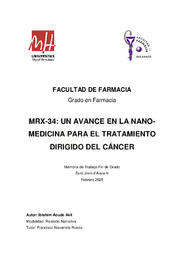Please use this identifier to cite or link to this item:
https://hdl.handle.net/11000/36381MRX-34: Un avance en la nano-medicina para el tratamiento dirigido del cáncer
| Title: MRX-34: Un avance en la nano-medicina para el tratamiento dirigido del cáncer |
| Authors: Aoude Akil, Ibrahim |
| Tutor: Navarrete Rueda, Francisco |
| Editor: Universidad Miguel Hernández |
| Department: Departamentos de la UMH::Farmacología, Pediatría y Química Orgánica |
| Issue Date: 2025-02-16 |
| URI: https://hdl.handle.net/11000/36381 |
| Abstract: Introducción. El miR-34 juega un papel crucial en la terapia anticancerígena al restaurar la regulación de la apoptosis, inhibir la proliferación celular y reducir la invasión tumoral, lo que lo convierte en un potencial supresor tumoral para el tratamiento del cáncer. Objetivos. Describir los avances de la nanomedicina para el tratamiento específico del cáncer mediante la aplicación de MRX-34, un mimético de miR-34. Metodología. Se presenta un diseño de estudio descriptivo de revisión narrativa, basada en el método PRISMA con la aplicación de criterios de selección. Resultados. A partir de la metodología PRISMA y la aplicación de los criterios de inclusión se han seleccionado un total de 8 documentos, de los cuales 4 se refieren a ensayos experimentales y 4 a ensayos clínicos aleatorizados (ECA) en fase I. Discusión y Conclusión. La evidencia científica reporta resultados relevantes referentes a la eficacia de MRX34 como tratamiento anticancerígeno, debida a la capacidad de modular la expresión de oncogenes clave involucrados en el cáncer, como CD44, NOTCH1 y BCL2. Mediante la administración de MRX34 se logra la reducción de la proliferación celular y la metástasis, con impacto positivo sobre las tasas de supervivencia de modelos animales de determinados tipos de cáncer, así como en algunos casos de cáncer desde el punto de vista clínico. La respuesta terapéutica es dependiente de la dosis suministrada, así como del tipo de neoplasia a tratar, por lo que se requiere de la personalización del tratamiento a partir del perfil genético del paciente, lo que permitiría la maximización de la eficacia. La seguridad del tratamiento aun representa un desafío ya que se evidencian eventos adversos graves como toxicidad hepática y trastornos del sistema inmune, que se han convertido en un factor limitante en el progreso de los ensayos clínicos. Así mismo, algunos autores sugieren la valoración de la sinergia entre MRX34 y otras moléculas que podrían estar potenciando su acción. Introduction. miR-34 plays a crucial role in anticancer therapy by restoring apoptosis regulation, inhibiting cell proliferation and reducing tumor invasion, making it a potential tumor suppressor for cancer treatment. Objectives. To describe the advances in nanomedicine for the specific treatment of cancer by applying MRX-34, a miR-34 mimic. Methodology. A descriptive narrative review study design is presented, based on the PRISMA method with the application of selection criteria. Results. Based on the PRISMA methodology and the application of the selection criteria, a total of 8 documents have been selected, of which 4 refer to laboratory-level trials and 4 to phase I RCT studies. Discussions and Conclusions. Scientific evidence reports relevant results regarding the efficacy of MRX34 as an anticancer treatment, due to its ability to modulate the expression of key oncogenes involved in cancer, such as CD44, NOTCH1 and BCL2. By administering MRX34, cell proliferation and metastasis are reduced, with a positive impact on the survival rates of animal models and, in some cases, humans. The therapeutic response depends on the dose administered, as well as the type of neoplasia to be treated, so treatment customization is required based on the patient's genetic profile, which allows maximizing efficacy. The safety of the treatment still represents a challenge for the scientific line since serious adverse events are evident, such as liver toxicity and immune system disorders, which have become a limitation in the progress of clinical trials. Likewise, some authors suggest the assessment of the synergy between MRX34 and other molecules that could be enhancing its action. |
| Keywords/Subjects: MRX-34 Nanomedicina Tratamiento Cáncer |
| Knowledge area: CDU: Ciencias aplicadas: Medicina: Farmacología. Terapéutica. Toxicología. Radiología |
| Type of document: info:eu-repo/semantics/bachelorThesis |
| Access rights: info:eu-repo/semantics/openAccess Attribution-NonCommercial-NoDerivatives 4.0 Internacional |
| Appears in Collections: TFG - Farmacia |
.png)

